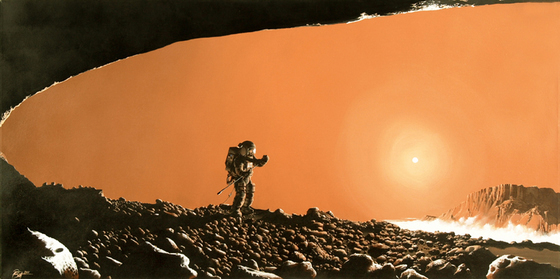[/caption]
Psychologists meeting this week at the American Psychological Association’s 116th Annual Convention are taking the time to discuss the challenges astronauts will face on the longer missions planned for NASA’s return to the moon and missions to Mars. Presenters at the first every symposium to address the psychological aspects of long-term spaceflight outlined the mental health challenges and introduced a new interactive computer program that will help address psychosocial issues in space. Psychologists said longer missions mean astronauts will be faced with immense psychological pressures as they adjust to being so far away from Earth, which could lead to depression and interpersonal conflicts. “Lessons learned from the past, research in extreme environments, training, conditioning, and countermeasures for psychological stress are some of the things NASA is in the process of addressing for the upcoming age of exploration,” said psychologist Marc Shepanek, PhD, from the Office of the Chief Health and Medical Officer at NASA.
Previously, not much thought had been given to the mental health of astronauts. These strong, intelligent and gifted astronauts seemed almost above psychological concerns. But these types of issues were brought to the forefront of everyone’s attention when astronaut Lisa Nowak was charged with attempted murder in a bizarre love triangle involving another astronaut. Historically, astronauts have been reluctant to admit to mental or behavioral health problems for fear of being grounded.
Psychologist James Carter, PhD, and his colleagues are in the process of developing a suite of interactive computer programs, dubbed the Virtual Space Station, using input from 13 veteran long-duration NASA astronauts who have flown on the International Space Station, Mir and Skylab. The system is being evaluated in a set of randomized controlled clinical trials. This interactive program will help astronauts prevent, detect, assess and manage their own psychosocial problems. They will learn how to cope with depression and how to resolve conflicts with other astronauts.
“Behavioral health problems can interfere with the success of the mission, especially on long-duration space flights like missions to the International Space Station, the moon and Mars. These self-guided software tools will provide private and immediate access to treatments even though the patient may be many miles from Earth,” Carter said in prepared remarks. The Virtual Space Station has already been deployed in Antarctica.
However, as astronauts aim to explore a new planet, the one they leave behind could be foremost on their minds. They will have limited contact with their families and radio communications with Mission Control will be delayed, possibly for as long as 40 minutes. In her presentation, family sociologist Phyllis Johnson, PhD, analyzed interviews with astronauts who had spent an extended amount of time in space. The astronauts identified what they felt was the role of NASA, themselves and their families in creating a “home away from home” during their flights. “For example, they emphasized the importance of regular communication regarding work, publicity and education, all of which provide connection to Earth and helped to reduce the perception of isolation,” said Johnson.
Psychologists also looked to history for guidance in future space missions. “The closest analogue to Mars exploration is the exploration of Earth,” said psychologist Peter Suedfeld, PhD. “Both maritime and terrestrial explorers struck off into the unknown, often for many years at a time.” Like space explorers, they had little or no communication with home, and had to devise ways of coping with unforeseen and unfamiliar hardships and dangers. Psychologists are re-examining sea and land voyagers’ diaries, logs and letters for a glimpse into how these explorers dealt with boredom, rebelliousness and dissent. They said it may be best way to predict some aspects of future long-duration missions.
News Source: EurekAlert


“This interactive program will help astronauts prevent, detect, assess and manage their own psychosocial problems. They will learn how to cope with depression and how to resolve conflicts with other astronauts.”
Introducing the HAL9000:
HAL: Look Dave, I can see you’re really upset about this. I honestly think you ought to sit down calmly, take a stress pill, and think things over.
HAL: I know I’ve made some very poor decisions recently, but I can give you my complete assurance that my work will be back to normal. I’ve still got the greatest enthusiasm and confidence in the mission. And I want to help you.
There is no real way to detect who and when they will crack under the pressure of isolation. Any remedial attempt to mitigate the inevitable will most likely fail. The human psychic a very fragile.
When and where is the next meeting, I’ve half a mind to attend.
HAL: Will I dream?
The American civil war can shed some insight…
General Joseph Hooker brought some really nice and friendly women in to keep the troops happy while those men faced the possibility of violently dying in the next battle.
They never lost.
Why is this such a mystery to NASA?
I’ll let the readers figure out where the term “Hooker” came from.
Congratulations. You are smarter than you were before you read this response.
Minion, I figured it out. It DOESN’T come from General J. Hooker. Check your Wiki facts.
As for this article, sure it may seem like the beginning of HAL but I’m glad at least someone is paying attention to the human psych factor of long term voyages. Astronauts are, after all, human.